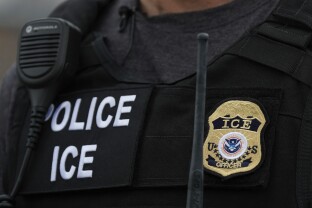Two months after a federal judge halted what she called “a policy and pattern of unlawful stops and arrests” in the Los Angeles area, the Supreme Court’s conservative majority is allowing deportation agents to resume detaining people based solely on their ethnicity or for speaking Spanish.
On Monday, the high court removed a temporary restraining order that had stopped Immigration and Customs Enforcement agents from conducting raids that singled out people because of the color of their skin or speaking in English with a foreign accent.
Justice Brett Kavanaugh criticized what he called “after-the-fact judicial second-guessing” of ICE agents, warning that “contempt proceedings will inevitably chill lawful immigration enforcement efforts.” He reasoned that the high court intervention was justified because the Trump administration would suffer “irreparable injury … particularly given the millions of individuals illegally in the United States [and] the myriad ‘significant economic and social problems’ caused by illegal immigration,” repeating a common conservative talking point on the issue.
This means that ICE can restart its strategy of targeting construction zones, farms, landscaping work, car washes and other business environments that are often staffed by migrants, and then detaining people as agents check on their immigration status.
Kavanaugh also cast doubt on any effort to stop federal law enforcement from relying on race-based targeting tactics, noting that “even if the government had a policy of making stops based on the factors prohibited by the district court, immigration officers might not rely only on those factors if and when they stop plaintiffs in the future.”
Department of Homeland Security spokesperson Tricia McLaughlin called the decision “a win for the safety of Californians” and added that “DHS law enforcement will not be slowed down.” The Justice Department did not respond to a request for comment.
In July, U.S. District Judge Maame Ewusi-Mensah Frimpong called out ICE’s tactics in a 52-page opinion that stressed that “compliance with the Fourth Amendment” — which protects against unreasonable searches and seizures by the government — “is nothing new.”
“Is it illegal to conduct roving patrols which identify people based upon race alone, aggressively question them, and then detain them without a warrant, without their consent, and without reasonable suspicion that they are without status? Yes, it is,” she wrote at the time.
The high court’s three liberals — Justices Elena Kagan, Ketanji Brown Jackson, and Sonia Sotomayor — would have kept the restraining order in place while the case makes its way to trial and likely up the appellate chain to the Supreme Court. Sotomayor wrote a dissent that criticized not only ICE but her colleagues as well.
“That decision is yet another grave misuse of our emergency docket. We should not have to live in a country where the government can seize anyone who looks Latino, speaks Spanish, and appears to work a low wage job. Rather than stand idly by while our constitutional freedoms are lost, I dissent,” she wrote.
In his concurrence explaining his legal reasoning for allowing ICE to resume these tactics, Kavanaugh put forth a technical argument claiming that United Farm Workers, Coalition for Humane Immigrant Rights and several individuals “likely lack Article III standing” to sue — based on the idea that federal agents probably aren’t going to specifically abuse their rights anytime soon.
“Plaintiffs have no good basis to believe that law enforcement will unlawfully stop them in the future based on the prohibited factors — and certainly no good basis for believing that any stop of the plaintiffs is imminent,” Kavanaugh wrote, adding that “they are ‘no more entitled to an injunction than any other citizen of Los Angeles.’”
Teresa Romero, president of United Farm Workers, issued a statement saying that “today’s SCOTUS ruling puts farm workers — and every Californian who looks or sounds like they might be an immigrant — in greater danger.”
Mark Rosenbaum, an attorney at the largest pro bono legal provider in the country, Public Counsel, warned that the decision “allows the Trump administration to resume racially discriminatory raids across Los Angeles.”
This story has been updated with a comment from DHS.
Sign in
Log into your free account with your email. Don’t have one?
Check your email for a one-time code.
We sent a 4-digit code to . Enter the pin to confirm your account.
New code will be available in 1:00
Let’s try this again.
We encountered an error with the passcode sent to . Please reenter your email.


